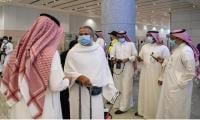Leaders of the Mohajir Rabita Council (MRC) on Friday accused the federal and Sindh governments of doing injustices to the Mohajir community living in urban areas of Sindh and demanded a judicial commission to look into the quota system in the province.
AQ Bandhani, president of the MRC, claiming to be a group of elders of the Mohajir community, spoke to a press conference at the Karachi Press Club, saying that the exploitation of the Mohajir community living in Sindh’s urban centers had been continuing for the past five decades.
MRC leaders Jamaluddin Saeed, Saleem Akaas, Sagheer Qureshi and Farhat Baji were also present on the occasion. He said that a biased quota system had been imposed on urban Sindh and the Pakistan Peoples Party’s provincial government was exploiting that quota too.
The MRC leader also questioned the impartiality of the Sindh Public Service Commission (SPSC), alleging it had intentionally not been recruiting Urdu speakers on government jobs and employed Sindhis on the position on the fake domiciles of urban Sindh.
“In the past eight years, the SPSC recruited 346 officers and among them, 236 were from rural Sindh,” Bandhani said. “But unfortunately, no one was Urdu speaker in 110 officers who were recruited from urban Sindh.”
Citing media reports that the Sindh government has been planning recruitment of 41,000 employees from grade one to grade 15, the MRC leaders demand that the provincial government should be bound to make sure representation of urban people and take political parties representing urban centers into confidence regarding it.
Bandhani said that the MRC would soon release a white paper examining how urban Sindh had been neglected in the quota system. “We demand from the federal government, the army chief and the chief justice of Pakistan to take notice of the injustices in the quota system,” he said.
He said that people would raise a demand for a separate province if the “Mohajirs are not given their due share in jobs and empowered local government system”.
“In the census, the drawing of constituencies and local government powers, everywhere Urban Sindh has been experiencing excesses,” he said.
MRC: Once a force
Political analysts believe that the MRC was one of the influential groups in Mohajir politics in the province, especially in Hyderabad, back in 1980s.
In March 1988, the MRC was formed by Maulana Wasi Mazhar Nadvi, a Jamaat-e-Islami leader from Hyderabad, who was expelled from the party in 1976, and his colleagues with the stated aim of working for the rights of the Urdu-speaking people.
During Zia’s period, Nadvi was appointed Hyderabad’s mayor and, for a brief time, federal minister of religious affairs.
Another member was Syed Ishtiaq Ahmed, a leader of the Muhajir Punjabi Pashtun Mahaz (MPPM) in the 1970s and later became a senator on an MQM ticket, but in the mid-eighties he criticised the MQM for cooperation with Sindh’s ethnic parties, especially the Jeay Sindh Movement, as well as with the PPP.
Dr Farhan Hanif Siddiqi, a political analyst, writes in his book ‘The Politics of Ethnicity in Pakistan: The Baloch, Sindhi and Mohajir Ethnic Movements’, that despite the presence of the MQM, the MRC was formed because the former was representative of the second generation of Mohajirs and the MRC mainly comprised Mohajir elders who had played an important role in Pakistan’s history for the last forty years. However, Siddiqi said that the political leadership soon developed differences with the MQM, and Maulana Nadvi resigned.
Differences developed within the MRC as well and its secretary general Nusrat Mirza formed his own Pakistan Mohajir Rabita Council. But in later years, the group gradually faded into oblivion.
Today, the MQM does not recognise the MRC as its subsidiary body; it is largely believed that the latter has close ties with the former. “The MRC has no connection with the MQM. It is altogether a separate entity which has no concern with the MQM’s organisational structure,” Bandhani told The News.
Most of the MRC’s former presidents – such as Ejaz Mehmood, Kazi Khalid Advocate and Syed Sufwanullah – were associated with the MQM.
The picture shows a pharmacy. — AFP/FileThe Karachi administration has launched a campaign to check the expiry dates...
In this still, Karachi Mayor Barrister Murtaza Wahab addresses an event on April 25, 2024. — Facebook/Barrister...
In this still, Sindh Inspector General of Police Ghulam Nabi Memon chairs a meeting at the Central Police Office on...
Representational image shows police tape. — AFP/FileAn elderly man who ran a general store was shot and killed in...
A handcuffed suspect stands behind the bars with a policeman standing outside the jail in this undated image. —...
In this still, Sindh Chief Minister Syed Murad Ali Shah meets federal energy minister Owais Ahmad Khan Laghari in...







